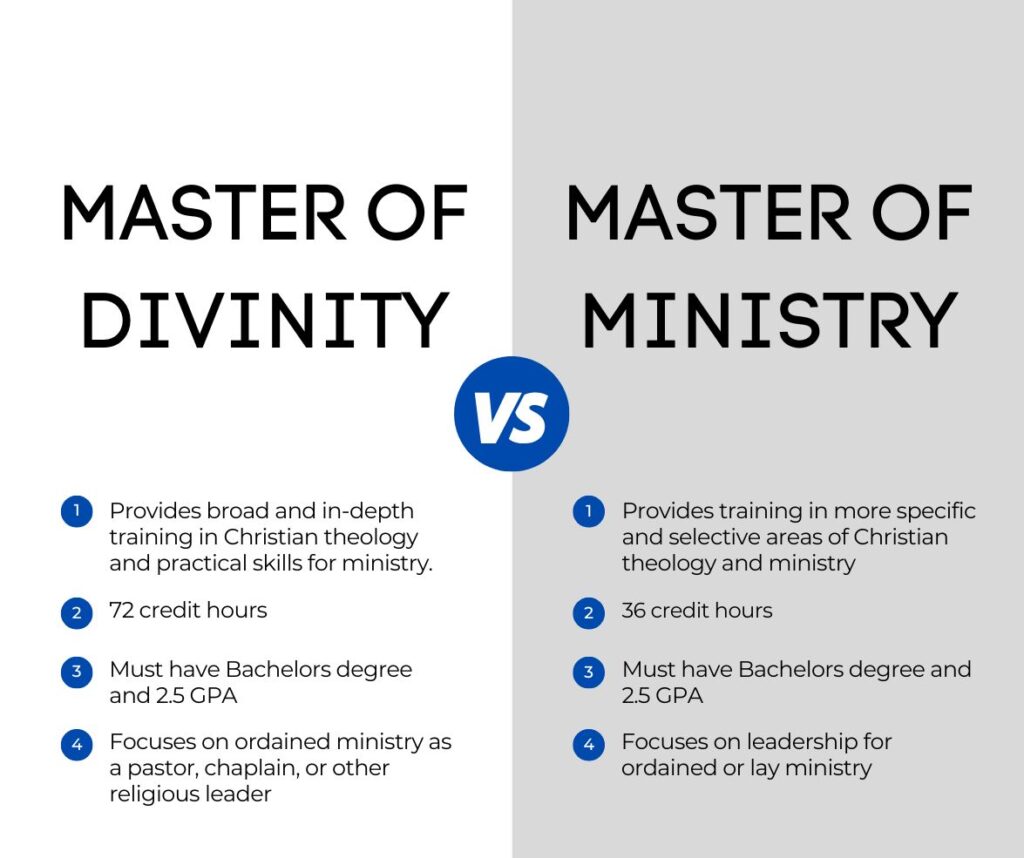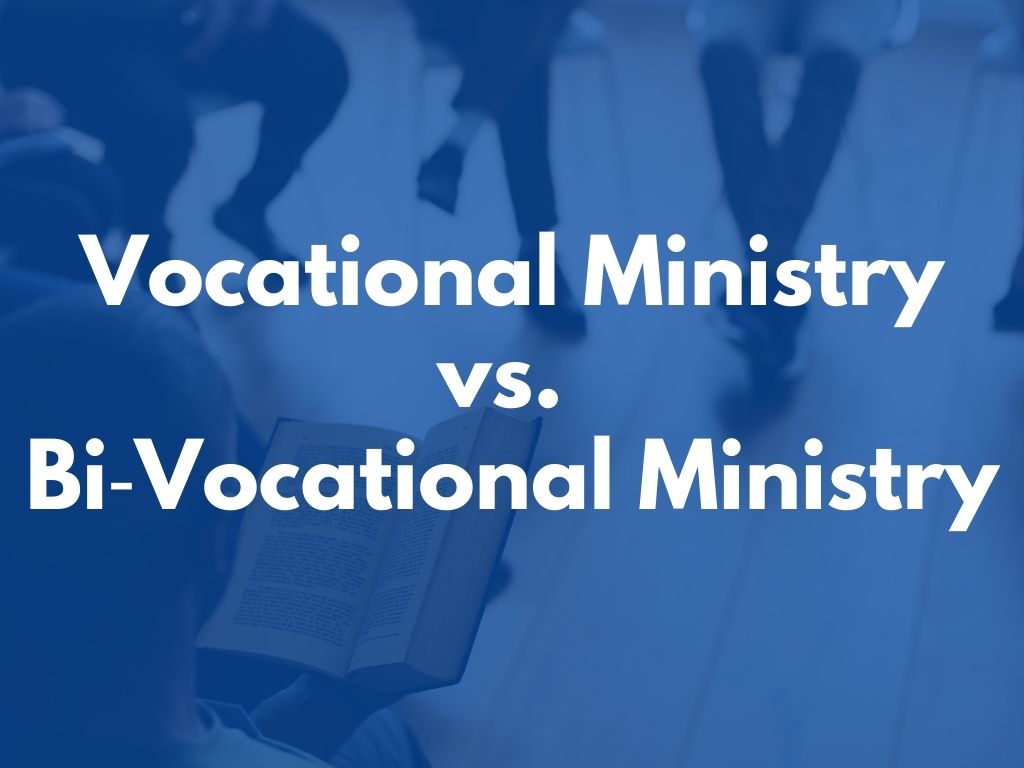Master of Ministry Vs. Master of Divinity
A master’s is a graduate-level degree, which you can earn in many different fields. Some of the most common master’s degrees people complete in theology are “Master of Divinity” and “Master of Ministry.”
These two programs offer similar opportunities and outcomes. But they’re not identical. Read on to learn more about the difference between these two master’s programs.
Are All Seminary Degrees the Same?
There’s a common misconception that all seminary degrees are the same. But each seminary degree provides a unique approach to learning about God, faith and religion for different career and ministry goals.
As mentioned, Master of Divinity (MDiv) and Master of Ministry are two of the most popular seminary degrees. Other seminary programs include Master of Theological Studies, Master of Arts in Christian Ministries, and more.
The Difference Between Master of Divinity and Master of Ministry
The primary difference between the two master’s degrees is the focus.

Master of Divinity
A Master in Divinity degree focuses on biblical studies and teaching within specific denominations or traditions. This program is usually recommended for ordination as a clergyperson within specific denominations or churches.
The focus of this degree is practical, yet comprehensive, preparation for ordination, ministry and leadership within certain denominations. This master’s program also prepares you to use your skills for God in different ways: in the local church, the mission field, or non-profit organizations.
Master of Divinity students study original biblical languages, such as Greek and Hebrew. They also study theology, including hermeneutics (the art and science behind interpreting scripture) and exegesis (the interpretive process).
MDiv students prepare for everything related to pastoral leadership: preaching and teaching, church administration, planning different types of worship services, leading stewardship and fundraising campaigns, offering faith-based counseling for major life events (marriage, sickness, grief),
Divinity grads can expect to graduate with a working knowledge of biblical Hebrew and Greek, the books of the Bible (and its contents), Christian doctrine from all major branches, as well as skills in interpreting scripture.
In addition, they’ll also have specialized training such that they feel confident enough to be preachers or pastors themselves. Other Divinity graduates use their degree for fieldwork like chaplaincy in health services or the military.
A comprehensive ministry degree, the Master of Divinity is generally 72-96 credit hours, whereas the Master of Ministry may be half that. At United, our Master of Divinity is 78 credit hours and can be completed in three to four years.
Master of Ministry
The Master of Ministry (MMin) is another degree that focuses on personal and professional development for Christian ministry. Compared to the deep theological foundation of a Master of Divinity, the MMin program provides broad knowledge in theology, biblical studies and worship.
This degree is a great choice for those preparing for ordination in a denomination that does not require a Master of Divinity degree as well as for those considering non-pastoral ministry. Those already in a ministry-related profession will benefit from the advanced study. It is often associated with non-profit organizations, social work agencies, and similar opportunities that focus on community service.
Similarities Between Master of Ministry and Master of Divinity
Despite the differences mentioned above, there are some similarities between these two master’s programs.
Both Master of Divinity and Master of Ministry degrees usually take more than two years to complete, although the Master of Ministry at United can be completed in as few as 3 semesters (1.5 year). Both can prepare you for ordained ministry as a pastor or deacon, depending on your denomination or church.
And both can be helpful in different ministry settings in or outside the church.
In addition, the Master of Divinity or the Master of Ministry can help prepare you for an advanced professional degree like the Doctor of Ministry. The right program for you depends upon your previous educational background and the requirements of the school offering the Doctor of Ministry.
Other seminary degrees you may want to consider include:
Master of Arts in Christian Ministries (MACM): equips people for leadership and service in various areas related to the Christian community’s public life and practice.
Master of Theological Studies (MTS): This master’s program is a research-based degree that requires you to complete a thesis project or final paper. It is a more academically-focused program than other seminary degrees.
Master of Arts in Religious Education (MA): This degree focuses on the knowledge of religious education and how to implement it in your community.
Master of Theology (ThM): This master’s program is a research-based degree that requires you to complete a thesis project or final paper. It often takes longer than other seminary degrees because there are more requirements.
Master of Arts in Biblical Languages (MABL): This degree focuses on the academic study of biblical languages and is usually required to become a professor.
Master of Arts in Christian Counseling (MAC): This master’s program explores different types of counseling, such as marriage, family, addiction, etc. It also requires the completion of a thesis project at the end.
What Is the Best Seminary Master’s Degree for You?
Both degrees are great options to consider. If you’re interested in becoming an ordained minister or working as a professional clergy member of some sort, then MDiv may be the best option for you. It is also the most commonly accepted degree in preparation for the Doctor of Ministry (DMin) degree.
But if your religious goals are more personal or professional, then MMin may be a better fit for you. The MMin may complement a non-theological master’s degree if you are preparing to continue into a DMin program at United.
No matter which master’s degree offers what is right for you- they’re both great opportunities to consider. Which one sounds like a good choice? It depends on your passion, career, and calling.
Master of Divinity Vs. Master of Ministry: We’ll Help You Choose the Most Ideal Program
There are many different types of master’s programs available for you to choose from. We want to help you find the one that best meets your specific needs and supports your God-given calling.
We’re also happy to talk with you about our various seminary degrees. We can even let you know how they compare against each other to make choosing a program easier.
Let us know what you’re curious about, and we’ll be in touch! We look forward to hearing from you soon.



